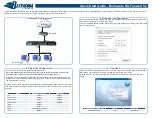
NORM
Normalize
13-182
Syntax
NORM
src, dst
Operation
norm (
src)
→
dst
Operands
src general addressing modes (G):
0 0
register (R
n, 0
≤
n
≤
7)
0 1
direct
1 0
indirect (disp = 0–255, IR0, IR1)
1 1
immediate
Opcode
31
24 23
16
8 7
0
15
0 0 0
0 1
1
0
0
1
dst
src
G
Description
The
src operand is assumed to be an unnormalized floating-point number; that
is, the implied bit is set equal to the sign bit. The
dst is set equal to the normal-
ized
src operand with the implied bit removed. The dst operand exponent is
set to the
src operand exponent minus the size of the left shift necessary to
normalize the
src. The dst operand is assumed to be a normalized floating-
point number.
If
src (exp) = –128 and src (man) = 0, then dst = 0, Z = 1, and UF = 0.
If
src (exp) = –128 and src (man)
≠
0, then
dst = 0, Z = 0, and UF = 1.
For all other cases of the
src, if a floating-point underflow occurs, then
dst (man) is forced to 0 and dst (exp) = –128.
If
src (man) = 0, then dst (man) = 0 and dst (exp) = –128.
Refer to Section 5.7,
Normalization Using the NORM Instruction, on page 5-37
for more information.
Cycles
1
Status Bits
These condition flags are modified only if the destination register is R7 – R0.
LUF
1 if a floating-point underflow occurs; unchanged otherwise
LV
Unaffected
UF
1 if a floating-point underflow occurs; 0 otherwise
N
1 if a negative result is generated; 0 otherwise
Z
1 if a 0 result is generated; 0 otherwise
V
0
C
Unaffected
OVM
Operation is not affected by OVM bit value.
Mode Bit















































